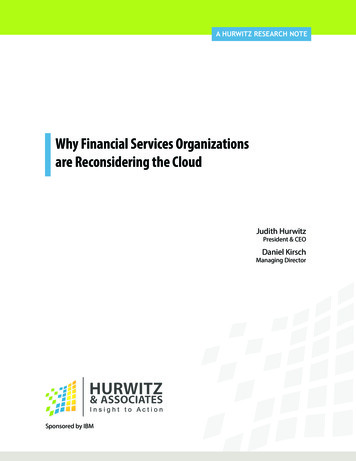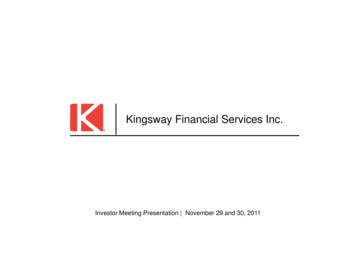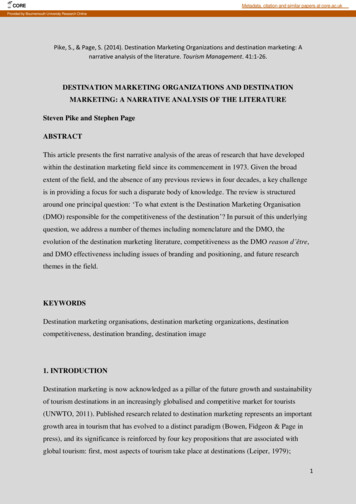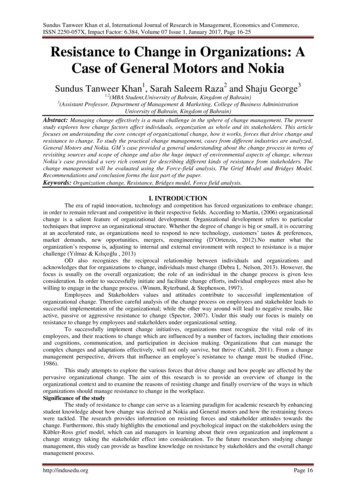
Transcription
A HURWITZ RESEARCH NOTEWhy Financial Services Organizationsare Reconsidering the CloudJudith HurwitzPresident & CEODaniel KirschManaging DirectorSponsored by IBM
A HURWITZ RESEARCH NOTEIntroductionOver the last decade nearly every business has moved significant workloadsto the public cloud. However, the financial services industry has lagged in thismigration to the cloud. Why? These enterprises store highly sensitive customerinformation that require high levels of security, must comply with state, nationaland international compliance and governance regulations, and must have 24/7uptime.Banks and other financial services institutions are rethinking their tepidapproach to the cloud for two significant reasons. Firstly, customers have beendemanding new ways of engagement and new offering – and are seekingFinTech alternatives if their bank can’t deliver. Just as significant, cloud serviceproviders are offering a new generation of industrialized offerings aimedat mature enterprises like financial services. Rather than a one cloud fits allapproach, where the same services are offered to startups, gaming companiesand mature enterprises, industrialized cloud offerings are specifically tailored fora specific vertical industry.Rather than a one cloudfits all approach, where thesame services are offered tostartups, gaming companiesand mature enterprises,industrialized cloudofferings are specificallytailored for a specific verticalindustry.Understanding financial services clouds – An apps-based approachversus a development platformCloud offerings designed for financial services organizations are not new. Manybanking organizations have adopted pockets of cloud computing throughthe use of SaaS applications for capabilities such as CRM and human resourcesmanagement. However, these companies have been hesitant to move sensitiveworkloads to the public cloud. Hosting customer data, regulated data andand corporate IP on a public cloud has been a non-starter for most financialinstitutions. However, this posture is changing with the advent of industryspecific cloud offerings.Vendors have taken two approaches to offering industrialized cloud productsto the banking industry. Some cloud providers are offering specific prebuilt, but customizable banking applications that are focused on providing aspecific banking functions for customers (for example mortgage approvals).On the other hand, some cloud vendors are taking a platform / ecosystemapproach that is designed to meet the needs of banks as well as upstream anddownstream partners. This ecosystem approach incorporates compliance andgovernance controls as well as security to ensure that all of the data, workloadsand apps offered within the ecosystem meets the requirements of the bankingindustry.In this article, we will look at IBM’s efforts to meet the banking industry cloudrequirements through its IBM Cloud for Financial Services platform . IBM hasembarked on the platform approach to building a cloud ecosystem. During ourresearch for this article we interviewed a number of IBM customers and partnersto understand their requirements for an industrialized financial services cloudecosystem.Why Financial Services Organizations are Reconsidering the CloudPage 2
A HURWITZ RESEARCH NOTEIBM’s Approach to Creating a Financial Services Cloud EcosystemWhile financial services companies have grown comfortable with the privatecloud they increasingly want to move to the public cloud because of scalabilityand elasticity. In addition, banks want to drastically increase their pace ofinnovation and create digital pipelines with IT suppliers that have cloud firstofferings. The foundation of IBM’s financial services offering, first introduced in2020 and expanded in 2021 focuses on a compliance framework that is built ontop of the IBM Cloud.The IBM Cloud for Financial Services cloud platform was co-developed withBank of America to address the needs of financial services companies. Theprimary objective of IBM’s offering is to deliver the benefits of public cloud(speed, elasticity, breadth of advanced data and security services) in a trustedenvironment capable of supporting confidential banking data and missioncritical workloads. To help advance its cloud platform and ensure that it meetsthe needs of the industry, IBM is working with a number of industry councils.These councils are made up of CXOs, including CTOs and CIOs from some of thelargest financial services companies in the world. These industry councils help toinform IBM as they drive towards creating an industry cloud standard.The primary objective ofIBM’s offering is to deliverthe benefits of public cloud(speed, elasticity, breadthof advanced data andsecurity services) in a trustedenvironment capable ofsupporting confidentialbanking data and missioncritical workloads.Thus far, IBM has signed up more than 90 ecosystem partners including ISVs,SaaS providers and systems integrators. Each of these partners is in the process ofbecoming IBM Cloud for Financial Services validated, with their services passinga rigorous certification of their offerings. One of the most recent additions to thepartner ecosystem is SAP.The Framework for IBM’s Financial Services CloudIn addition to the industry councils, IBM also relies on the expertise ofPromontory Financial Group, a subsidiary of IBM. Promontory is made up offormer regulators, along with compliance, legal and governance experts thathelp advise financial services clients as well as IBM product teams on how tocreate offerings that adhere to the changing governance landscape. By utilizingthese resources, the IBM Cloud Framework for Financial Services, providesindustry-informed, risk-centric security and compliance controls required tooperate in a public cloud. This Framework forms the underpinning for all of theservices, data and workloads on the cloud ecosystem -- whether they are ISVapplications, bank owned workloads or IBM services and software.Figure 1: The controls framework for IBM Cloudfor Financial Services enables pre-configuredcontrols and monitoring across bank workloads,cloud services and the technology partners(ISVs/SaaS/Fintechs.)Why Financial Services Organizations are Reconsidering the CloudPage 3
A HURWITZ RESEARCH NOTEYou can think of this industry offering as a walled-off section of the IBM Cloudthat includes all of the security, governance, auditability and compliance thatthe banking industry requires. At the same time, the Financial Services Cloudbenefits from the innovation, scalability and resiliency of the IBM Cloud. Theframework of this financial services cloud has been designed to support thefollowing three pillars: Bank Apps & Workloads – During an interview with a bank CXO, he said“although our front-end systems of engagement have been modernized, westill relay on outdated systems that must be modernized.” This offering fromIBM is designed to help banking organizations migrate critical workloads anddata to the cloud so that they can be modernized to support new businessmodels and increasing customer expectations. Third Party SaaS / ISV Apps – Banks rely on thousands of IT suppliers, andmaking sure these partners comply with banking industry regulations is ahuge cost to banks and creates long sales cycles for banking suppliers. Whenwe interviewed a sales and marketing executive at a mid-sized bankingapplication vendor, she explained that “we often have to go through a sixto nine month process for each client to certify our offerings.” The executivewent on to explain that “by building our application on IBM’s banking cloudwe expect to drastically reduce the approval process because all of thecertifications are already in place.”“By building our applicationon IBM’s banking cloudwe expect to drasticallyreduce the approvalprocess because all of thecertifications are already inplace.” IBM Cloud Services – In addition to creating an ecosystem that now hasmore than 90 partners, IBM Cloud services also comply, offering regulatedbuilds of runtimes, developer and data services. The company will be offeringapplications like its Cloud Paks and AI services on the Financial Servicescloud.The below visualization helps to summarize the IBM Cloud for Financial Servicesframework and the three pillars that sit on top of the IBM Cloud:Figure 2: The IBM Cloud for Financial Services is both a cloud platform and ecosystemof financial institutions and technology partners.Why Financial Services Organizations are Reconsidering the CloudPage 4
A HURWITZ RESEARCH NOTEThe value of the IBM Cloud for Financial Services platformAs we interviewed banking executives and IBM ecosystem business partners, itbecame very clear that banking organizations need to move quickly. Financialservices firms are being challenged by new competitors and business models ona nearly daily basis.As financial services organizations look to compete and offer clients new servicesthey need technology that can support both industry governance requirementsand the need for digital reinvention. The IBM Cloud for Financial Servicesis focused on three core capabilities that are needed by financial servicescompanies: Contiuous Compliance. The IBM Cloud for Financial Services provides preconfigured controls that enable continuous compliance and governancecapabilities that helps businesses safely move to the cloud while reducingcompliance costs. In addition, the IBM Cloud Security and Compliance Centerdashboard enables banks to continually monitor and enforce security andcompliance policies while aided by automated remediation.With its fourth generationConfidential Computing,IBM offers the ability tosafely run data workloadsboth on premises and onmultiple public clouds. Accelerate innovation. The typical financial services business needs tomanage a large number of ISV partners. As more ISV partners move to theIBM Financial Services Cloud, banks can innovate faster because they haveassurances that suppliers are offering services on a secure and compliantplatform. Without this assurance, vendors have to go through lengthycompliance and governance processes that can take upwards of a year. Inaddition by moving to the IBM platform, DevOps teams gain the flexibilityof the cloud while management can be confident that the businesses ismaintaining compliance. Agility across the business. Financial services companies are rapidlyadopting a hybrid and multicloud architecture so that they can runworkloads anywhere depending on the nature of the data and workloads.With its fourth generation Confidential Computing, IBM offers the ability tosafely run data workloads both on premises and on multiple public clouds.Client and Business Partner BenefitsHurwitz & Associates interviewed a number of IBM clients and business partnersto understand their assessment of the cloud platform for the financial servicesindustry. While these business partners were at different levels of maturity onthe industry cloud ecosystem, all articulated that the need to easily prove tocustomers that their offerings were made for the enterprise and met industrycompliance and governance standards. IBM Business Partners all indicted thatbuilding solutions on a standardized compliance framework had saved themhuge amounts of money. By being certified on the IBM Cloud for FinancialServices these partners did not have to spend as much time and moneycertifying their offerings to clients. In addition, sales cycles were reducedbecause many of the common objections around governance and security wereovercome through the platform’s existing capabilities. IBM Business Partners arealso anticipating the value of working with other ecosystem partners.Why Financial Services Organizations are Reconsidering the CloudPage 5
A HURWITZ RESEARCH NOTESenior managers at financial services organizations have to ensure that theircustomer data is safe and adheres to governance compliance standards fortheir industries and their geographies. Therefore, it is increasingly clear to thesemanagers that they have to move rapidly to innovate with hybrid cloud servicesthat are both innovative and always compliant. Combining the continuousthreat of competition with the dramatic changes brought on by the pandemichas forced even more rapid transformation throughout the entire digital supplychange of financial institutions.ConclusionWe see the next 12-16 months as an important period for the IBM Cloud forFinancial Services. The last year has been about creating an ecosystem thatincludes anchor banking clients as well as growing the partnership communityfrom 30 to more than 90. We expect the momentum behind IBM’s industrialcloud for banking to accelerate as capabilities like Red Hat OpenShift, VMwareworkloads and Confidential Computing are all now supported. IBM’s approachof creating an industry specific cloud and ecosystem can be seen as a blueprintwith the likelihood of other industry-focused clouds in the near future.Why Financial Services Organizations are Reconsidering the CloudCombining the continuousthreat of competition withthe dramatic changesbrought on by the pandemichas forced even morerapid transformationthroughout the entire digitalsupply change of financialinstitutions.Page 6
About Hurwitz & AssociatesHurwitz & Associates is a strategy consulting, market research and analyst firm that focuses on howtechnology solutions solve real world customer problems. Hurwitz research concentrates on disruptivetechnologies, such as Cloud and Multicloud Management, Big Data and Analytics, Machine Learning andArtificial Intelligence, Information Security, DevOps, and emerging infrastructure platforms that are definingthe future of business agility. Their experienced team merges deep technical and business expertise todeliver the actionable, strategic advice clients demand. Additional information on Hurwitz & Associatescan be found at www.hurwitz.com. Copyright 2021, Hurwitz & AssociatesAll rights reserved. No part of this publication may be reproduced or stored in a retrieval system ortransmitted in any form or by any means, without the prior written permission of the copyright holder.Hurwitz & Associates is the sole copyright owner of this publication. All trademarks herein are the propertyof their respective owners.One Mifflin Place, Suite 400, Cambridge, MA 02138 Tel: 617-597-1724www.hurwitz.com
governance controls as well as security to ensure that all of the data, workloads and apps offered within the ecosystem meets the requirements of the banking industry. In this article, we will look at IBM’s efforts to meet the banking industry cloud requirements through its IBM Cloud











